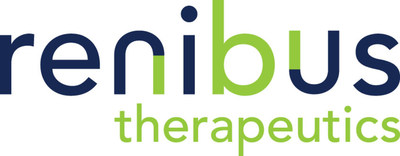Renibus Therapeutics® (“Renibus”), a clinical-stage biotech company focusing on the prevention and treatment of cardio-renal diseases, today announced positive 30-day topline data from RBT-1 in a Phase 2 trial.
|
-RBT-1 met the primary biomarker endpoint as well as several key clinical endpoints; positive data supports the potential for RBT-1 to improve postoperative outcomes in cardiothoracic surgery- -RBT-1 treatment demonstrated a reduction in time on ventilator, ICU days, length of hospital stay and 30-day hospital readmission rates- -Planned pivotal Phase 3 study of RBT-1 to be initiated in Q1 2023- SOUTHLAKE, Texas, Jan. 5, 2023 /PRNewswire/ -- Renibus Therapeutics® ("Renibus"), a clinical-stage biotech company focusing on the prevention and treatment of cardio-renal diseases, today announced positive 30-day topline data from RBT-1 in a Phase 2 trial. RBT-1 met the primary endpoint of increasing biomarkers of cytoprotective preconditioning in a multicenter, double-blind, placebo controlled, Phase 2 study in patients undergoing coronary artery bypass graft (CABG) and/or cardiac valve surgery on cardiopulmonary bypass. These results provide further support to advance RBT-1 into a pivotal Phase 3 study to improve clinical outcomes following cardiothoracic surgery. "These positive topline data provide strong support for RBT-1's potential to reduce the risk of multiorgan injury and thereby improve post-operative outcomes in patients undergoing cardiothoracic surgery," said Dr. Bhupinder Singh, MD, Chief Medical Officer of Renibus. "With these Phase 2 data, we are well positioned to advance RBT-1 into a Phase 3 registrational study in the first quarter of 2023. In addition, we intend to report the full data on RBT-1 from the Phase 2 trial at medical meetings later in the year." In November 2022, Renibus announced that the U.S. Food and Drug Administration granted Fast Track Designation for RBT-1 based upon its potential to impact meaningful clinical outcomes in cardiothoracic surgery patients. Summary of 30-Day Topline Data
The Phase 2 trial enrolled a total of 152 subjects from cardiac surgery centers in the US, Canada and Australia, of which 132 were evaluable for the primary endpoint (ITT population) and 121 were evaluable for secondary and exploratory clinical endpoints (MITT population) as pre-specified in the protocol and statistical analysis plan. RBT-1 treated patients demonstrated a highly significant increase in anti-inflammatory and antioxidant biomarkers of cytoprotective preconditioning. The biomarkers assessed were interleukin-10, heme oxygenase-1 and ferritin. In addition, several clinically meaningful improvements were observed. These results are summarized below:
"RBT-1 has shown improvements in post-surgical outcomes in patients undergoing cardiac surgery including reductions in ventilator time, days in ICU and hospital readmission rates, which are critical endpoints in the ICU and hospital setting," stated Dr. Andrew Shaw, MD, Professor and Chair, Department of Intensive Care and Resuscitation, and a Leader in Perioperative Medicine. "The results of the Phase 2 study of RBT-1 serve as a positive step forward in advancing the treatment paradigm for cardiorenal diseases." Dr. Glenn Chertow, MD, Professor of Medicine, Epidemiology and Population Health, and Health Policy at Stanford University, commented, "I was encouraged by the Phase 2 trial results comparing two doses of RBT-1 and placebo in patients undergoing cardiac surgery. These data suggest that RBT-1 can provide wide protection against organ damage, and has the potential to reduce post-operative complications, lengths of stay, and costs of care. I was particularly impressed that favorable results were seen across a wide array of postoperative events and other outcomes included in a clinically meaningful composite endpoint. I look forward to working closely with the Renibus team and others on the design and implementation of a Phase 3 trial." About the Phase 2 Trial of RBT-1
The Phase 2 study (NCT04564833) is a randomized, multi-center, placebo-controlled trial evaluating the effect of RBT-1 in patients undergoing coronary artery bypass graft (CABG) and/or cardiac valve surgery. Renibus previously announced interim results from the RBT-1 Phase 2 study in November 2022 and June 2022. Renibus Corporate Update
Renibus also announced today that Dr. Jeff Keyser, RPh, JD, PhD, and Mr. Frank Stonebanks, MBA, have been appointed to the position of Co-CEOs. In addition, board member Dr. Henrik Rasmussen, MD, PhD, has been named Chairman of the Renibus Board of Directors. About Renibus
Renibus is a clinical stage biopharmaceutical company dedicated to treating, improving and extending patients' lives by developing breakthrough products to prevent disease progression, improve outcomes and protect against organ damage in cardiorenal diseases. The Company has developed a robust portfolio of products that activate multiple cytoprotective pathways, including organ protection via preconditioning. Renibus' first-in-class lead program, RBT-1 (stannic protoporphin/iron sucrose), is a potent inducer of Nrf2, IL-10, and ferritin. RBT-1 is currently in Phase 2 development in cardiac surgery and will soon enter a Phase 3 registration study for its lead indication to reduce the risk of postoperative complications following cardiothoracic surgery. RBT-2 is an antioxidant and anti-fibrotic drug that has been shown to reduce the risk of CKD progression in preclinical models and will be in IND enabling and clinical development in 2023. RBT-3, a novel, low molecular weight iron nanoparticle, is one component of RBT-1 and is targeted at reducing the risk of cisplatin-induced nephrotoxicity and will be taken into clinical development in 2023. RBT-9 (stannic protoporphin) is a potent anti-inflammatory and antioxidant drug with broad spectrum anti-viral properties. It has been investigated in a 42-patient Phase 2, randomized, placebo-controlled trial in high-risk patients with COVID-19. Treatment with RBT-9 showed a statistically significant improvement in clinical status by 7 days (p<0.05) as well as a statistically significant reduction in hospital length of stay (-7.9 days, p<0.05). Additional pre-clinical work is underway to help inform the clinical development strategy. For more information, please visit the Company's website at www.Renibus.com and engage with us on LinkedIn. Investor and Media Contact: Amy Conrad Business Development Contact Frank Stonebanks
SOURCE Renibus Therapeutics |





